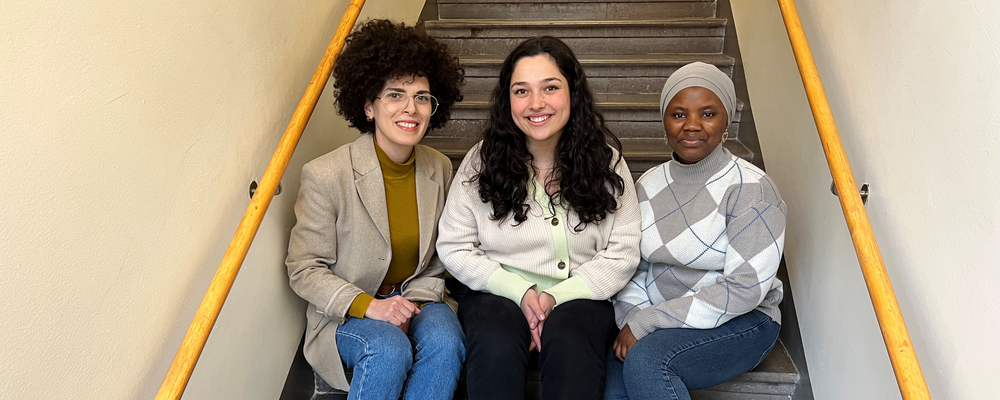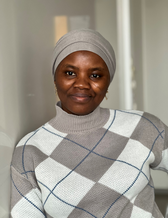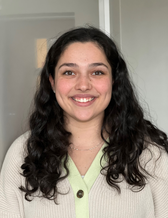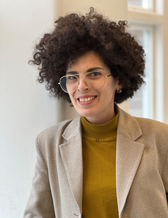
- Home
- News and events
- Find news
- Course linking migration and health gives in-depth insights
Course linking migration and health gives in-depth insights
Master’s students of both public health science and global health are praising the course Migration and Health in a Social, Demographic and Political Context. This course explores links between the two highly topical subjects of migration and the human right to health, using learner-centred, participatory methods.
This spring semester, for the first time, the course has been provided entirely face-to-face. Migration and Health in a Social, Demographic and Political Context addresses immigration and emigration in terms of health and relates them to social, demographic, and political structures. It is designed as an elective course for the Master’s program in Public Health, but is also open to students in other programs, such as the Master’s program in Global Health.
Lively discussions
Sahada Shaibu from Ghana and Clotilde Frade from Portugal are two of the students who have been taking the course this semester. They express great appreciation of the lively discussions with their fellow students and the teachers.

“This is the first time I’ve heard about migration in connection with human rights. In the discussions with my classmates, I’ve realized that no great importance is attached to the link between migration and health in my home country. There are numerous migrants in the West African regions, but decision-makers rarely consider the health aspects in their policy work,” says Sahada Shaibu.

Shaibu adds that she thinks migrants’ situation in her home country could be facilitated if broader discussion took place in the community.
“There are so many different variables that affect migrants’ scope for a healthy life, including gender and age, the country concerned, and policies implemented there. On the course, we’ve discussed the perspectives that are known as ‘intersectionality’ and also affect migrants’ ability to achieve a healthy life,” says Clotilde Frade, adding “I truly recommend this course to anyone who is interested on how migration is connected to health. Be prepared to have fruitful discussions and to bring your own experience and thoughts to the table."
Learning from one another
This time, every student on the course has been of non-Swedish origin. As such, all of them are migrants of a kind themselves. The student-activating teaching methods in use entail supplying the students with fact-based material before the teaching occasions and then sharing their experience and viewpoints, and hence learning from one another.
The teachers, too, gain new insights and perspectives. Sometimes the questions are more interesting than the answers, thinks lecturer Mayssa Rekhis, who has headed the course jointly with Jesper Löve during autumn semester 2022. Today, migration is often portrayed as a problem, which she thinks is wrong. She points out that there have always been population movements and migration, and that they are part of being human.

“In recent years, the impact of migration on health has been given growing attention, but usually from a narrow and uncritical perspective where migrants are in a vulnerable situation, or that they represent health risks to host countries. In this course, we tried to look at migration and health from a more holistic and critical perspective, looking at how racism, borders and structures are what create vulnerability and what impacts not only migrants but racialized people’s health and lives,” Rekhis says.
Originally from Tunisia, she gained her Ph.D. in anthropology in Paris before joining the University of Gothenburg.
Other conditions
The COVID-19 pandemic is a clear example of how different groups are unequal in relation to protecting their own health and for benefitting from society’s safety mechanisms. When the disease spread in high-income countries, migrants were especially hard hit. Many lived in cramped lodgings and had jobs that were not possible to do at home, which exacerbated the risk of them becoming infected. Moreover, community barriers impeded their access to testing, treatment, and vaccinations. The pandemic also accelerated digitalization of health care. This means that digitally disadvantaged people, with no internet or computer access, encountered more obstacles.
A good life in Gothenburg
The students on the International Master’s programs come from various backgrounds, with differing career goals for life after finishing their education. Clotilde Frade studied industrial management and logistics in Portugal. She is enjoying Gothenburg so much that she hopes to be able to find a relevant job and stay a while longer.
“Logistics, migration, and health are linked by consumption and multinational corporations. Most of all, I’d like to work on something relating to migration or climate change, but exactly what it’ll be I don’t know yet,” Frade says.
Sahada Shaibu has a university degree in health care administration from Ghana. After her master’s degree, she aspires to build her qualifications further with doctoral education. The Migration and Health course inspired her.
“Right now, I don’t know whether it’s migration or health policy I’m most interested in. I think both areas are really exciting. In the long run it would, of course, be interesting to work on issues at international level, perhaps at the United Nations. But there’s also a lot of very important work to be done at regional or local level,” Shaibu says.
By: Elin Lindström

